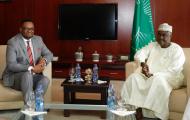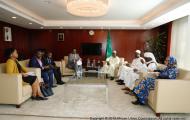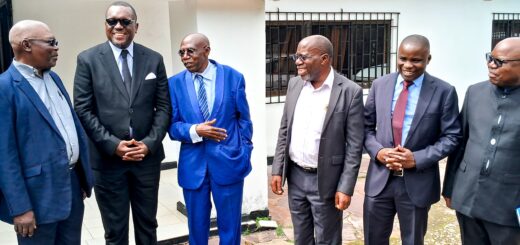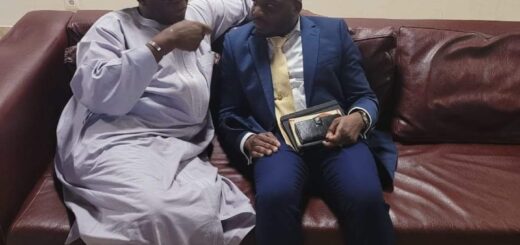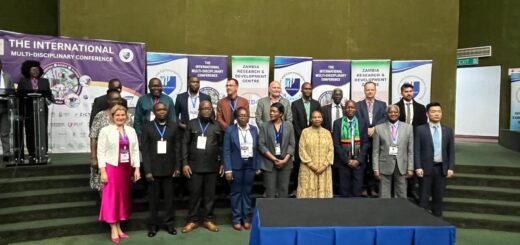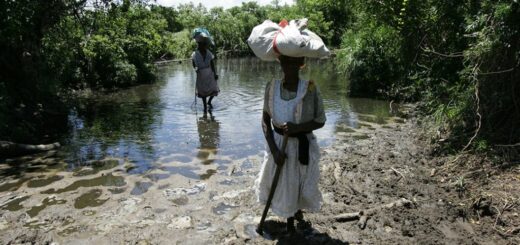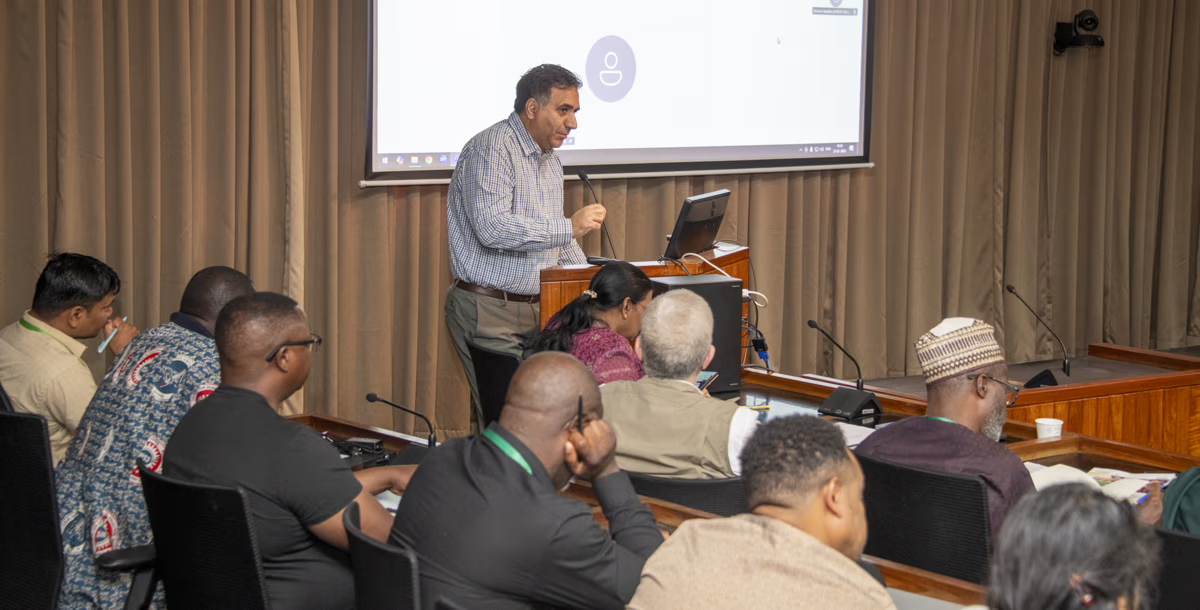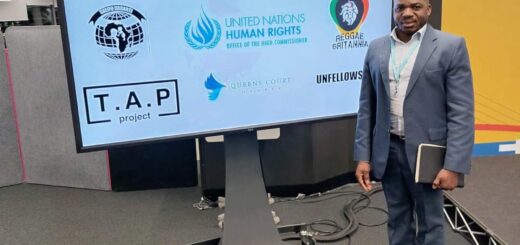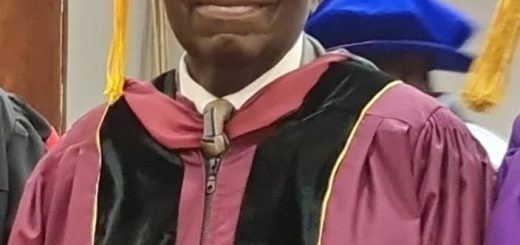“Ku Joba fye! …Ambassador Emmanuel Mwamba with Professor Kenneth Omeje
Notice: Undefined index: catFilterList in /home/zambi/public_html/wp-content/plugins/wp-likes/api.php on line 243
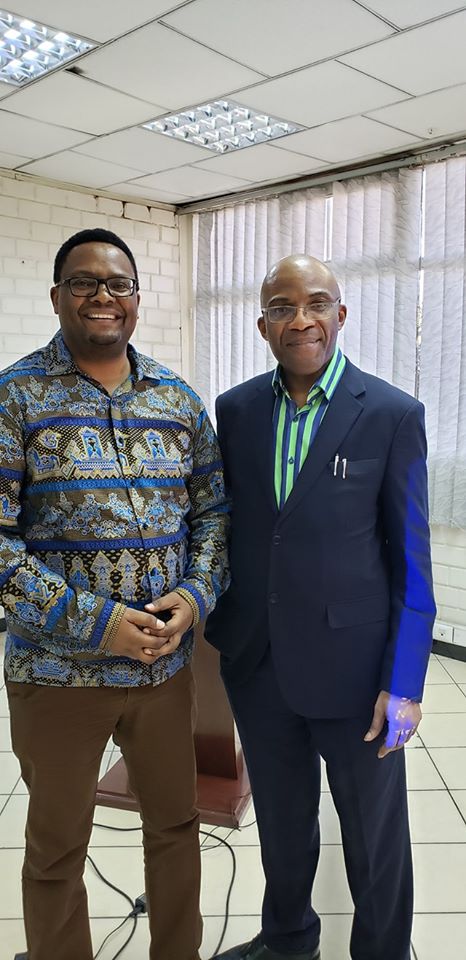
H.E. Mr. Emmanuel Mwamba, Ambassador of Zambia to Ethiopia, Permanent Representative to the African Union (AU) with his Professor Kenneth Omeje
Ku Joba fye!
With my Professor, Prof. Kenneth Omeje.
This is during my on-going studies at the Institute for Peace and Security Studies(IPPS) under the University of Addis Ababa.
Wilson Mambwe Indeed, Ku Joba fye, not buying Honorary Doctorates!!
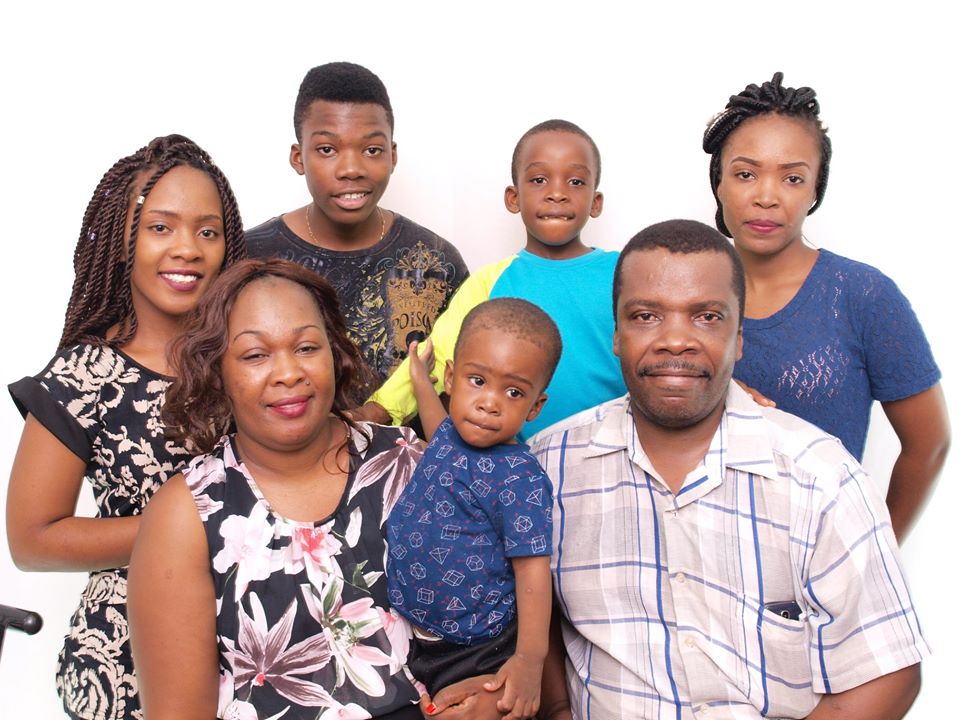
Wilson Mambwe family picture

Prince Kabala
Prince Kabala You are a graduate already based on Gods wisdom at work in you,your excellency Emmanuel Mwamba.

Lewis T Chilufya
Lewis T Chilufya Capwafye! ku joba fye
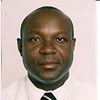
Gershom Chilukusha All the best na jobbing. Those that buy are a problem.
Gershom Chilukusha All the best na jobbing. Those that buy are a problem.

Lisa Mpasela Epela! Ku joba fye
Lisa Mpasela Epela! Ku joba fye
Africa Peace and Security Programme (APSP)
The Africa Peace and Security Programme (APSP) is a joint programme of the African Union and Institute for Peace and Security Studies (IPSS) of Addis Ababa University, mandated by the African Union Executive Council Decision (AU) (EX.CL/567 (XVI), and the follow-up Memorandum of Understanding signed between the two institutions, to take up the intellectual challenge of defining African-centred Solutions (AfSol) through training, research and advocacy around African peace and security issues. With the mandate from the AU, IPSS has positioned itself to provide a veritable and honest platform for the incubation and exchange of innovative ideas, and translating such ideas into concrete action.
Our vision is to be a premiere source for substantial and high quality contributions towards the promotion of African-led solutions for peace and security challenges for the African Union, Regional Economic Communities (RECs), and Regional Mechanisms (RMs).
Our mission entails:
- Building the capacity of professionals through the provision of substantial, first-rate practical education and training based on a deep understanding of the issues as well as on cutting-edge adult education methodologies.
- Developing data and concepts for action and programme design among top decision makers and experts.
- Providing practical advice to the African Union, RECs, and RMs.
- Bringing together institutions with relevant expertise from all sectors of African social and political life and facilitating their collaboration with the AU, RECs, and RMs; and supporting the AU in reaching out to them.
APSP is substantially funded by the Federal Republic of Germany with contributions from the Ministry of Economic Cooperation and Development (BMZ) and the Ministry of Foreign Affairs implemented through Deutsche Gesellschaft für Internationale Zusammenarbeit (GIZ). The support is based on a long-term agreement that extends to 2017. Other contributors are the Austrian Development Cooperation (ADC), several other development partners (Norway, Italy, Switzerland, and Belgium) as well as members of the African private sector (Dangote Enterprises and Brenthurst Foundation).
Yonas Adaye Adeto, PhD
Director, Institute for Peace and Security Studies
Yonas Adaye Adeto (PhD) is the Director of the Institute for Peace and Security Studies (IPSS). He holds a BA and MA in English from Addis Ababa University; an MA and Postgraduate Diploma in International Relations and Security Studies and a PhD in Peace Studies from the University of Bradford, UK. Yonas has spent more than 20 years teaching at Addis Ababa University, as well as served in different administrative posts at AAU and IPSS. From 1996 to 2000 he was the Sophomore English Coordinator at AAU. After joining IPSS in 2007, he worked in different administrative capacities including: Director (2007 – 2009); Deputy Director (2012 – 2014); Regular MA Programme Coordinator (since 2009) and Associate Academic Director (since 2014).
Michelle Ndiaye
Director, Africa Peace and Security Programme (APSP) / Head of Secretariat, Tana Forum
Michelle Ndiaye is currently the Director of the Africa Peace and Security Programme at the Institute for Peace and Security Studies (IPSS), a joint programme with the African Union Commission (AUC) and the German Cooperation (GIZ), and also Head of the Tana Forum Secretariat.
Her expertise covers defense and security, peace and security, democratic and local governance, post-conflict and community recovery, sustainable development, environmental issues, transitional justice, communication for development, corporate responsibility and global reporting, institution building, and large-scale multi-donor programme management.
She is an external reviewer for the African Affairs Journal, Africa Insight Journal, and the South African Journal of International Affairs.
Ms. Ndiaye sits on the Programme Committee of Security and the Rule of Law in Fragile and Conflict-Affected Settings at the Netherlands Organisation for Scientific Research; she is also a board member of the Atlantic Dialogues Advisory Board (AD-AB) at the Policy Center for the New South, Morocco and the African Center for Economic Transformation (ACET) based in Accra, Ghana.
Michelle Ndiaye is an adjunct faculty member at the Africa Center for Strategic Studies, working on issues surrounding African security sector leadership, security cooperation and national security strategies.
Before joining IPSS, Ms. Ndiaye was the Managing Director of the Mandela Institute for Development Studies and headed several African and international organizations, including as Executive Director of Greenpeace Africa, CEO of the African Institute for Corporate Citizenship, and Founder and Manager of Africa Projects for Akena Research and Consulting. She started her career as a program officer at the African Institute for Democracy, a UNDP project based in Dakar, Senegal.
Ms. Ndiaye holds a BA in political science from Quebec University in Montreal, Canada, an MA in public law and a post-graduate degree (DEA) from University Cheikh Anta Diop in Dakar, Senegal. She is currently a doctoral candidate at the University of Leipzig, Germany.
She was listed in the New African Magazine as one of the top 100 Most Influential Africans of 2018.
Publications
“Better Migration Management: Rethinking the Development and Mobility Paradigms!” Paper to be published as a book chapter; Global Migration Movements, GIZ, May 2019. (In English).
“The Relationship between AU and RECs/RMs in Relation to Peace and Security in Africa: Subsidiarity and Inevitable Common Destiny”. Published as a book chapter in January 2016 by Africa Now Zed Books. (In English).
“Between Multidimensionality and Integration: The Feasibility of an African Model of Peace Operations”. Lead paper presented at the 13th APSTA Conference and Annual General Meeting, Addis Ababa, Ethiopia; 7-9 September 2015.(In English).
“Peace and Security in Africa: Preventing Conflict and Consolidating Peace for an Inclusive Development Trajectory”. Third India-Africa Strategic Dialogue, New Delhi, India; 3-4 March 2015 published under the title “India-Africa: Building Synergies in Peace, Security and Development” by the Institute for Defence Studies and Analysis, India. (In English).
“The Role of UNDP in Supporting Democratic Elections in Africa”. UNDP, 2013. Consultant and co-author. (In English).
“The South African Energy Sector Jobs: How the Energy Revolution will Create Sustainable Green Jobs”. Greenpeace Africa, 2010. Editorial supervision. (In English).
The Issue, quarterly magazine, Greenpeace Africa. Editorial supervision, 2009-2011. (In English).
“The CSR Landscape in Africa”. Research paper released in January 2009 by the African Institute of Corporate Citizenship. (In English).
“Building Content and Capacity in Community Radio: Training, Content Development, Networking and ICTs”, Amarc Africa, 2004. (In English).
“Guide on Legislation and Licensing for Community Radio in Africa”, ed. Amarc Africa, 2003. (In English).
“Community Radio in Africa: The Growing Field for Sustainable Development”. Paper presented at the AIC worldwide conference Broadcasting Africa 99 in Johannesburg, October 1999 and published in the Review ECONEWS Africa, May 2000. (In English).
Habari, quarterly review (policy and advocacy), Amarc Africa, Editor, 1999-2006. (In English).
“Media and Democracy in Africa”. The ACP-EU courier, No 170, July – August 1998. (In English and French).
“Political Parties and Democracy in Senegal”. African Democracy, No 12, January – March 1998.(‘’Democraties Africaines’’ – In French).
“The Political System in Niger: Interview with President Bare Maïnassara”. African Democracy, No 11, July – September 1997. (‘’Democraties Africaines’’ – In French).
“Post-Electoral Contestation in Senegal”. African Democracy, No 9, January – March 1997. (‘’Democraties Africaines’’ – In French).
“The Gambian Military Regime and its Electoral Legitimacy”. African Democracy, No 7, July – September 1996. (‘’Democraties Africaines’’ – In French).
“The Co-operation between the European Union and ACP Countries in the Perspective of the Common Market”. African Democracy, No 5, January – March 1996. (‘’Democraties Africaines’’ – In French).
States, Culture and Society in Africa. Ed. African Democracy, 1996. (Assistant Editor). (In English and French).
“A Human Face of Structural Adjustment in Africa: The Example of the Canadian Co-operation”. African Democracy, No 3, July – September 1995. (‘’Democraties Africaines’’ – In French).
“The Idea of a Permanent Mechanism for Conflict Prevention and Resolution in Africa”. African Democracy, special issue, May 1995. (‘’Democraties Africaines’’ – In French).
Guide on the rights and duties of Senegalese citizens. Ed. African democracy, 1995. (CA collective publication). (‘’Democraties Africaines’’ – In French).
History
The Institute for Peace and Security Studies (IPSS) was established at Addis Ababa University (AAU) in 2007 following a tripartite agreement among AAU, the Royal Danish Embassy in Ethiopia, and the University for Peace Africa Programme. The initial vision of creating a premier higher learning and research institution on peace and security studies in the Horn of Africa received further stimulation when AAU named IPSS as one of its five Centres of Excellence in 2010.
Since its inception, IPSS has promoted peace and security through research, education, and outreach. IPSS provides above-standard academic and professional training for conflict analysis and conflict prevention, management, resolution, and peace-building with an all-African outlook. The institute organises different forums (conferences, panel discussions, briefing sessions, and seminars) to conduct and disseminate research and expertise and to promote values of a democratic and peaceful society. With our activities, we reach out to communities as much as to international and Africans institutions to build a community of knowledge and practice for solving contemporary challenges to peace and security in Africa.
Call for Applications Joint MA and PhD Programme in Global Studies (with special emphasis on peace and security in Africa)
Global Studies is a multidisciplinary approach which aims to contribute to globalisation research by critically challenging existing narratives and orthodoxies about globalisation. As a reaction to both the experience of globalisation and the conviction that nation-states are the most efficient social frame for getting connected and securing sovereignty, Global Studies seek to systematically pose a challenge to methodological nationalism, which ignores largely trans-national aspects of interactions and comparisons. In addition to contributing to the ongoing analytical and intellectual debate on globalisation, Global Studies lends practical relevance by offering a unique vantage point which helps in critically examining contemporary global challenges transcending national boundaries.
How to Apply
To apply for the MA programme, please click here
To apply for the PhD Programme, please click here
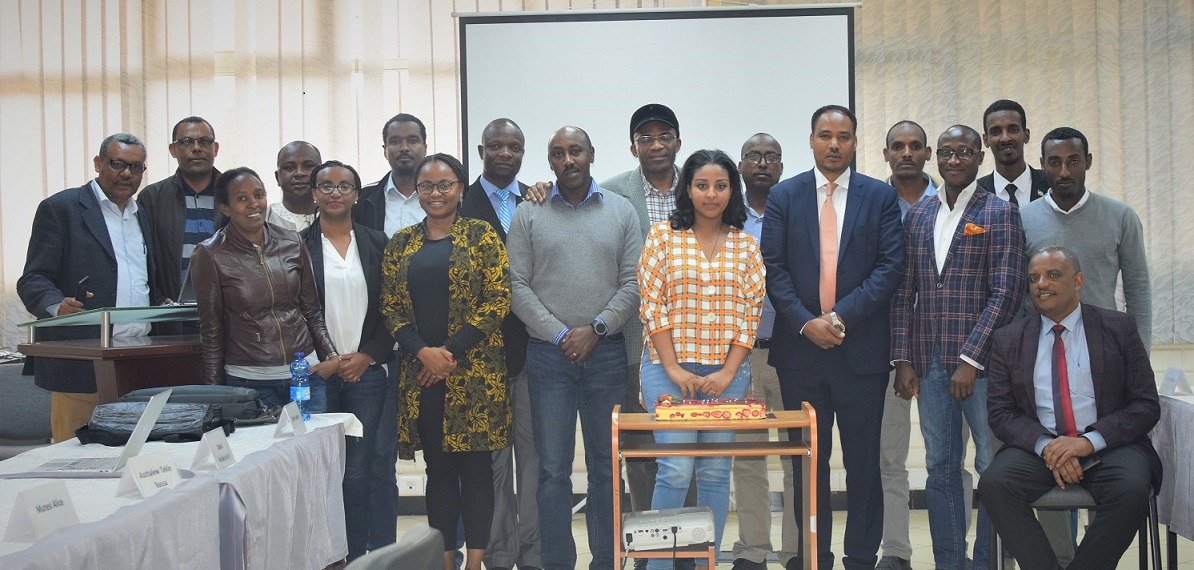
On 6 October 2019, IPSS welcomed the 15th cohort of its Executive Master’s in Managing Peace and Security in Africa
Prof Kenneth Omeje Director
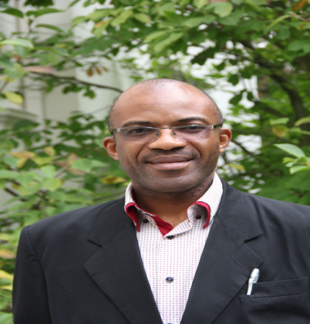
Prof Kenneth Omeje
Kenneth Omeje is Director, Manifold Crown Consulting Services in Bradford, UK; Visiting Professor, Institute for Peace and Security Studies (IPSS) in Addis Ababa University, Ethiopia; Research Fellow, Centre for African Studies, University of the Free State, Bloemfontein, South Africa; Senior Research Associate, Faculty of Humanities, University of Johannesburg, South Africa; and Visiting Professorial Fellow, Department of Political Science and Defence Studies, Nigerian Defence Academy, Kaduna, Nigeria.
With over 25 years of professional academic experience, Kenneth holds a PhD degree in Peace Studies from the University of Bradford and MA degree in Peace & Conflict Studies from the European University Centre for Peace Studies in Stadtschlaining, Austria.
He has previously held the position of Senior Research Fellow at the John and Elnora Ferguson Centre for African Studies, University of Bradford, UK (January 2014 – December 2017); and Professor of
International Relations at the United States International University in Nairobi, Kenya (January 2009 – December 2016).
Kenneth is the author of High Stakes and Stakeholders: Oil Conflict & Security in Nigeria (Aldershot: Ashgate, 2006); Extractive Economies and Conflicts in the Global South: Multi-regional Perspective on Rentier
Politics (ed. Ashgate, 2008); State – Society Relations in Nigeria: Democratic Consolidation, Conflicts and Reforms (ed. London: Adonis & Abbey, 2007); War to Peace Transition: Conflict Intervention and
Peacebuilding in Liberia (ed. Lanham-Maryland: University Press of America, 2009); Conflict of Securities: State and Human Security in Africa (co. ed. London: Adonis & Abbey, 2010); Conflict and Peacebuilding in the African Great Lakes Region (co. ed. Indiana: Indiana University Press, 2013), The Crises of Postcoloniality in Africa (edited, Dakar: CODESRIA, 2015), etc. He has more than 80 publications, including books, book chapters, contributions to international encyclopedias and articles in well regarded peer-reviewed journals.
With a strong inclination to policy research and training, Kenneth has developed and implemented diverse externally-funded conflict intervention and peace education capacity-building projects in various African countries,
including Sierra Leone, Liberia, Nigeria, DRC, Kenya, Uganda and South Sudan. He has served as grantee or consultant to projects funded by the British Council, DFID, UNDP, MacArthur Foundation, among other
international agencies.
Kenneth has previously held visiting research fellowship positions at the Centre for African Studies, University of Florida, Gainesville, USA (Spring, 1992); the Law Department, Keele University, UK (Spring, 2000), Institute of Higher Education, Comprehensive University of Kassel, Germany (Summer, 2000), and Department of International Politics, University of Wales, Aberystwyth (Spring, 2001); and Georg Eckert Institute (GEI) in Braunschweig, Germany (Autumn 2014).
Furthermore, Kenneth is a Fellow of the West Africa Institute (WAI) in Praia, Cape Verde and a member of the Advisory Board of the African Peacebuilding Network (APN) of the Social Science Research Council (SSRC) of New York. Email: komeje@manifoldcrown.org
Meeting with H.E. Mr. Emmanuel Mwamba, Ambassador of Zambia to Ethiopia, Permanent Representative to the AU.


